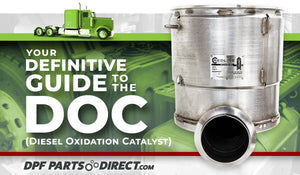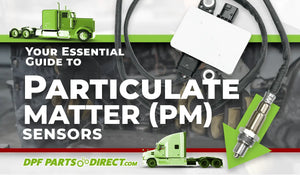If you have a Volvo D13 engine in your fleet, it’s essential to know how to care for and maintain the aftertreatment system, especially the Diesel Particulate Filter (DPF). Read on for a comprehensive overview of the Volvo D13 DPF filter and its engine.

The Volvo D13 engine is known for its durability and long service life, making it a cost-effective choice for heavy-duty trucking operations. The Volvo D13 provides the power, efficiency, and reliability that companies need to keep their operations running smoothly.
This engine is a popular choice among heavy-duty trucking companies for its reliable performance and fuel efficiency. With a 13-liter displacement and a range of power outputs, the D13 is well-suited for a variety of applications, from long-haul transportation to construction and mining.
The engine's advanced technology, such as its I-Shift automated transmission and integrated exhaust aftertreatment system, also helps to reduce emissions and improve fuel economy.
The DPF in the Volvo D13's Aftertreatment System
The diesel particulate filter (DPF) is a critical component of the Volvo D13 engine's aftertreatment system. Its main function is to capture and remove particulate matter (PM) emissions, commonly known as soot, from the exhaust gases before they are released into the atmosphere.

The DPF is typically made of a ceramic or metallic material that is designed to trap PM emissions on the filter's surface. The trapped PM is then periodically burned off, a process known as regeneration, to clean the filter and restore its performance. The DPF is an essential component in meeting emissions regulations and reducing the environmental impact of heavy-duty trucking operations.
It is important to note that regular cleaning and maintenance are required to ensure its proper function and longevity. And not doing so can lead to clogging, reduced engine performance, and higher emissions.
Volvo D13 DPF Filter Maintenance & Cleaning Challenges
Maintaining and cleaning the Volvo DPF can present certain challenges for heavy-duty trucking companies. One of the main challenges is ensuring that the filters are cleaned and replaced regularly. The accumulation of soot and other contaminants on the filter's surface can lead to clogging, which can reduce the filter's performance and increase emissions.
Additionally, if the filter is not cleaned regularly, the high temperatures required for regeneration can cause damage to the filter, reducing its service life.
Another challenge is to ensure that the filter is cleaned safely and effectively without causing any damage to the filter. Some cleaning methods, such as abrasive blasting or using harsh chemicals, can damage the filter's substrate and cause it to fail prematurely.
It is important to use a cleaning method and solution that is compatible with the specific filter being used, as different filters may have different cleaning requirements. Heavy-duty trucking companies must also be aware of the latest emissions regulations and ensure that their DPF filters meet the required standards.
Maintaining and cleaning Volvo D13 filters can be a complex task, but it is essential for the performance and longevity of the engine, and for meeting emissions regulations.
DPF Maintenance for Volvo D13 Engine Performance & Longevity

Regular cleaning and replacement of the Volvo D13 DPF are crucial for ensuring the overall performance and longevity of the Volvo D13 engine. A clogged filter can lead to reduced engine performance, increased emissions, and even engine damage. Cleaning and replacing these filters regularly will maintain their performance and help prevent clogging and damage.
Also, it will help to meet emissions regulations and prevent costly repairs or replacements down the road. Regular cleaning and replacement will extend the service life of the DPF filter, which can lead to significant cost savings for the heavy-duty trucking company.
It is important to note that each engine and filter has a specific service interval, and it is crucial for the company to stick to this schedule. Regularly checking and monitoring the DPF filter's pressure drop, soot load, and other parameters can also help to predict when a cleaning or replacement is needed.
By following these guidelines and best practices, heavy-duty trucking companies can ensure that their Volvo D13 engines continue to perform at optimal levels and meet emissions regulations while also saving money in the long run.
Use a DPF Cleaning Machine or Replace Your DPF Entirely?

When it comes to maintaining diesel particulate filters, heavy-duty trucking fleets must weigh the cost-effectiveness of using a DPF cleaning machine versus replacing a filter entirely. On one hand, replacing this filter can be a significant expense, especially if the filter is replaced frequently.
However, a new DPF filter will be in perfect condition and will not require any maintenance for a certain period. On the other hand, using a cleaning machine can extend the service life of the filter, keeping it re-conditioned. This reduces the frequency of replacements and saves money in the long run.
Additionally, using a DPF cleaning machine can also improve the overall performance of the engine and reduce emissions, which can lead to additional cost savings in terms of fuel consumption and maintenance. It is also important to consider the environmental impact of replacing filters more frequently, as it can generate more waste and pollution. The cost of a cleaning machine can be spread out over time, as it can be used to clean multiple filters, while the cost of replacing a filter must be incurred each time.
It is important to consider the specific needs of your heavy-duty trucking fleet and the frequency of filter replacements to determine the most cost-effective option. A DPF cleaning machine may be a worthwhile investment for companies that have a high number of filters in need of cleaning, while replacement may be more cost-effective for companies with a smaller fleet or less frequent replacement needs.
Avoiding the Consequences of Improper Maintenance
Not properly maintaining and cleaning diesel particulate filters can have serious consequences for heavy-duty trucking companies, including decreased engine performance and increased emissions. A clogged DPF can restrict the flow of exhaust gases, leading to increased backpressure and decreased engine performance. This can lead to reduced fuel efficiency, increased maintenance costs, and even engine damage. Additionally, a clogged diesel particulate filter can also cause the engine to enter a "limp home" mode, where the engine power is reduced to prevent damage.
A clogged DPF can also lead to increased emissions, which can result in penalties and fines for heavy-duty trucking companies that fail to meet emissions regulations. Not properly maintaining and cleaning particulate filters can also lead to increased downtime for vehicles, which can affect the company's productivity and bottom line.
It is essential for heavy-duty trucking companies to regularly clean and maintain their filters to ensure optimal engine performance and compliance with emissions regulations. Not doing so can lead to costly repairs and replacements, decreased productivity, and financial penalties.
Should Your Fleet Use a DPF Cleaning Machine?
Using a specialized cleaning machine, like the Filtertherm® DPF cleaning machines stocked at DPFPartsDirect.com, can bring a range of benefits for heavy-duty trucking companies. One of the main benefits is the ability to effectively clean and restore these filters, ensuring they continue to perform at optimal levels and meet emissions regulations.
These machines use advanced technology and specialized cleaning solutions to break down and remove the soot and other contaminants that have accumulated on the filter's surface. This not only improves the filter's performance but also extends its service life, which can lead to significant cost savings for the company.
Additionally, using a specialized DPF cleaning machine can also improve the overall performance of the engine and reduce emissions. Investing in a specialized cleaning machine can be a wise decision for heavy-duty trucking companies and fleets looking to improve the performance and longevity of their engines while also reducing emissions and saving money.
What Are the Types of DPF Cleaning Machines?
There are two types of Fil DPF cleaning machines: thermal and aqueous. These each have their benefits and drawbacks. While most heavy-duty DPFs can be cleaned by either method, there are some light- and medium-duty filters that are easier to clean with the aqueous method:
Thermal DPF Cleaning Machines

Thermal DPF cleaning machines are specifically designed to clean DPFs using heat. They go through testing and calibration to ensure they are operating at the right temperature and give a thorough clean. While many cleaning machines are just modified kilns, the thermal cleaning system from Filtertherm® was specifically designed with smart features to make DPF cleaning easier and faster.
Aqueous DPF Cleaning Machines

Use water to clean DPFs of all shapes and sizes, without long bake cycles. The combination of proprietary surfactants and continuous low-pressure/high-volume water is proven to return DPFs to like-new specifications. The combination of a Filtertherm® Aqueous cleaning machine with a quick-drying cabinet can allow a higher volume and DPFs to be cleaned each day.
Diagnosing Common Issues With D13 DPF Filters
Troubleshooting and diagnosing common issues with Volvo D13 diesel particulate filters (DPF) can be a complex task. One of the most common issues is clogging, which can be caused by a buildup of soot and other contaminants on the filter's surface. To diagnose clogging, it is important to monitor the filter's pressure drop and soot load, as well as pay attention to any unusual engine performance or emissions issues.
Another common issue with DPF filters is malfunction, which can be caused by a variety of factors, such as a faulty sensor, clogged injectors, or a malfunctioning control module. To diagnose malfunction, it is important to check for diagnostic trouble codes (DTCs) and to check the operation of the filter's sensors and actuators.
Regularly monitoring the filter's performance and paying attention to any unusual engine performance or emissions issues can help to detect problems early and prevent them from becoming more serious. Additionally, using advanced diagnostic tools such as a DPF pressure gauge, soot load sensor, and software updates can also help to diagnose and troubleshoot issues with these filters.
It is also important to refer to the manufacturer's recommendations and guidelines to diagnose and troubleshoot any issues that may arise.
Choosing the Best DPF Filter Replacements
There are a lot of options for Volvo D13 DPF filter replacements, and it can be difficult to gauge which brand to buy. A popular option is to replace the filter with an OEM unit. Purchasing an OEM unit offers guaranteed quality and fitment. However, OEM DPFs can be very expensive, especially when the cost is multiplied for fleets.
In the aftermarket, there are dozens of brands to choose from, and lower prices could mean lower quality if you don’t know what to look for. We proudly offer DPFs from Redline Emissions Products. Their filters are tested to OEM standards or better and are manufactured in the USA.
They even feature the patent-pending Born on Weight™, which is the exact weight of the DPF in grams when brand-new. This handy feature is useful for future cleanings, where you and your DPF cleaning shop can compare the Born on Weight™ to the after-cleaning weight of the filter to see how thorough the cleaning was.
Prioritize the Maintenance & Cleaning of Your Volvo DPF Filters

The maintenance and cleaning of Volvo D13 DPF Filters are essential for ensuring the overall performance and longevity of the engines used in heavy-duty trucking operations. Diesel particulate filters play a critical role in reducing emissions and meeting regulations, and regular cleaning and replacement are necessary to ensure their proper function.
Companies that prioritize the maintenance and cleaning of their filters can see significant benefits in terms of improved engine performance, fuel efficiency, and reduced emissions, as well as cost savings in terms of maintenance and repairs.
Investing in a Filtertherm® DPF cleaning machine system can be a cost-effective solution for heavy-duty trucking companies looking to improve the performance and longevity of their engines while also reducing emissions and saving money. Additionally, regular monitoring, troubleshooting, and following the manufacturer's recommendations can also help to ensure that the filters are in good condition.
Heavy-duty trucking fleets are encouraged to prioritize the maintenance and cleaning of their Volvo D13 DPF filters for the overall performance and longevity of their engines. Get a Quote from DPF Parts Direct today to see which DPF filters are best for your needs!










Comments 0